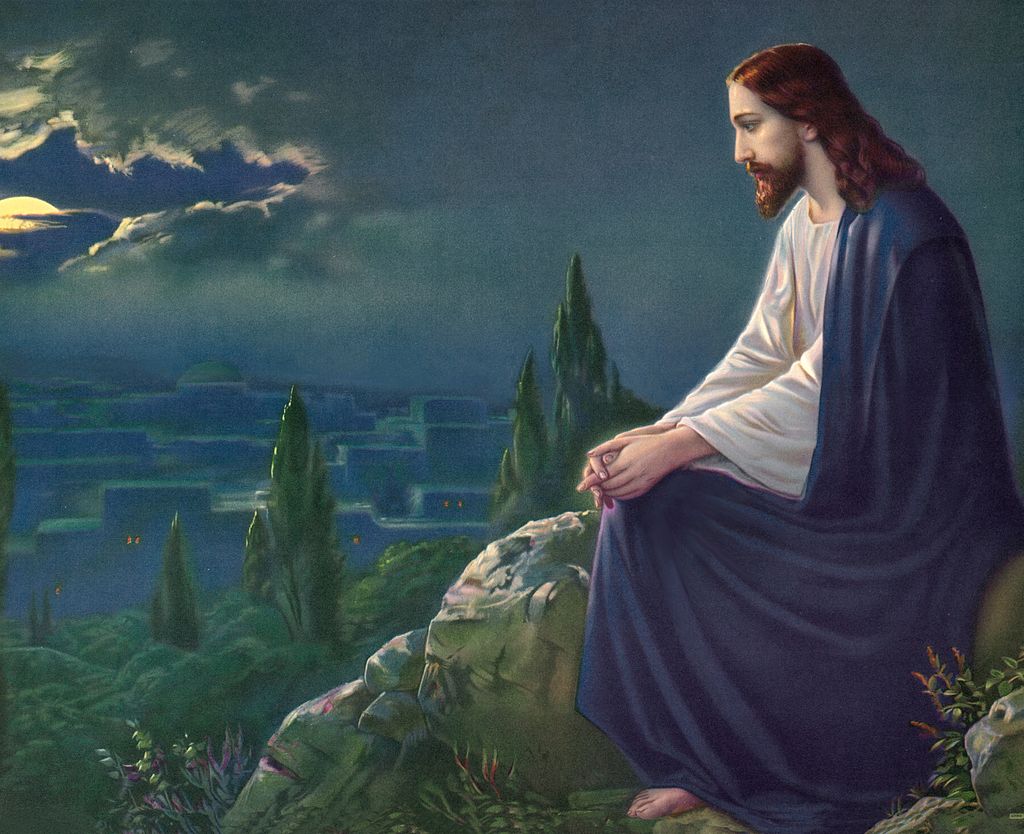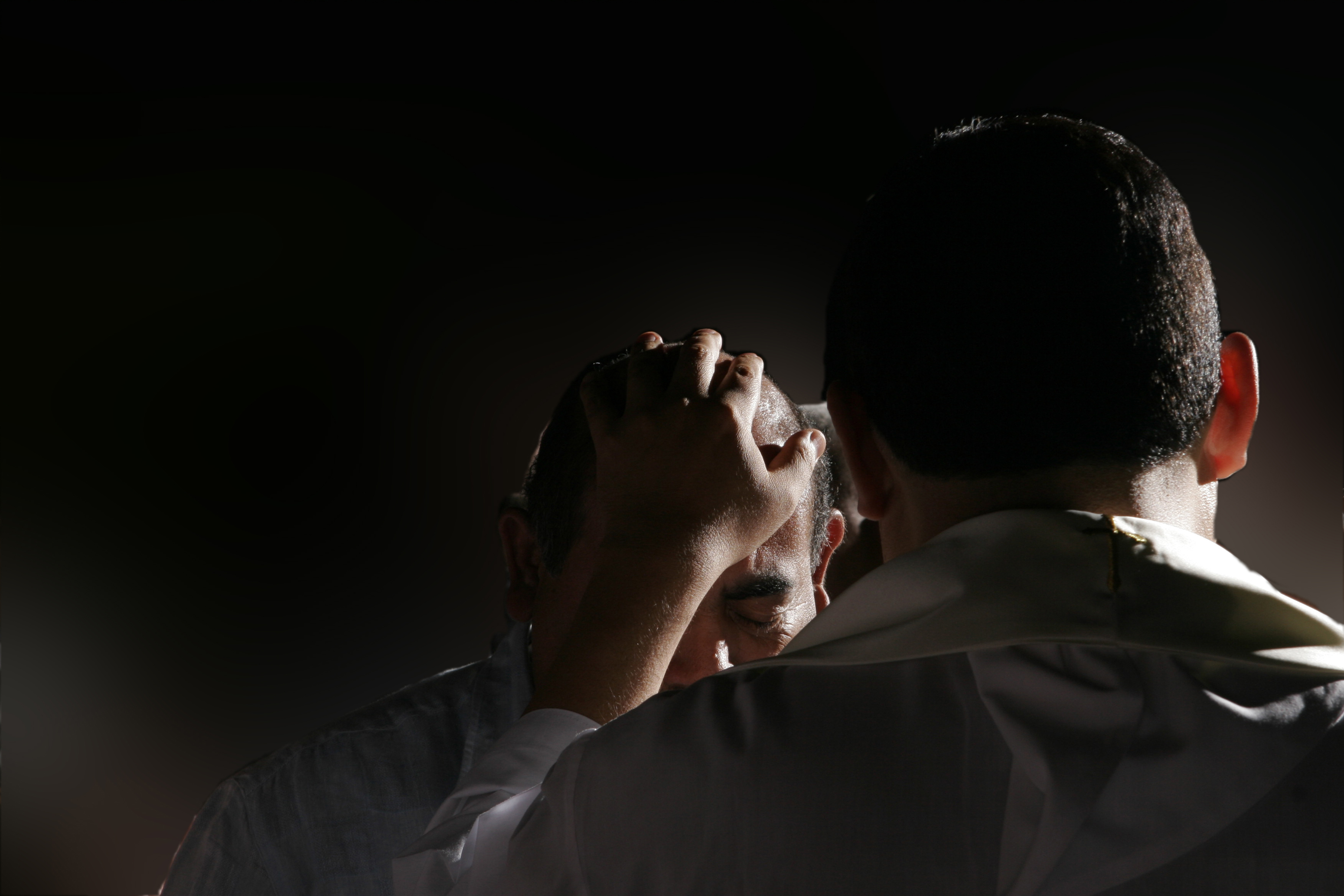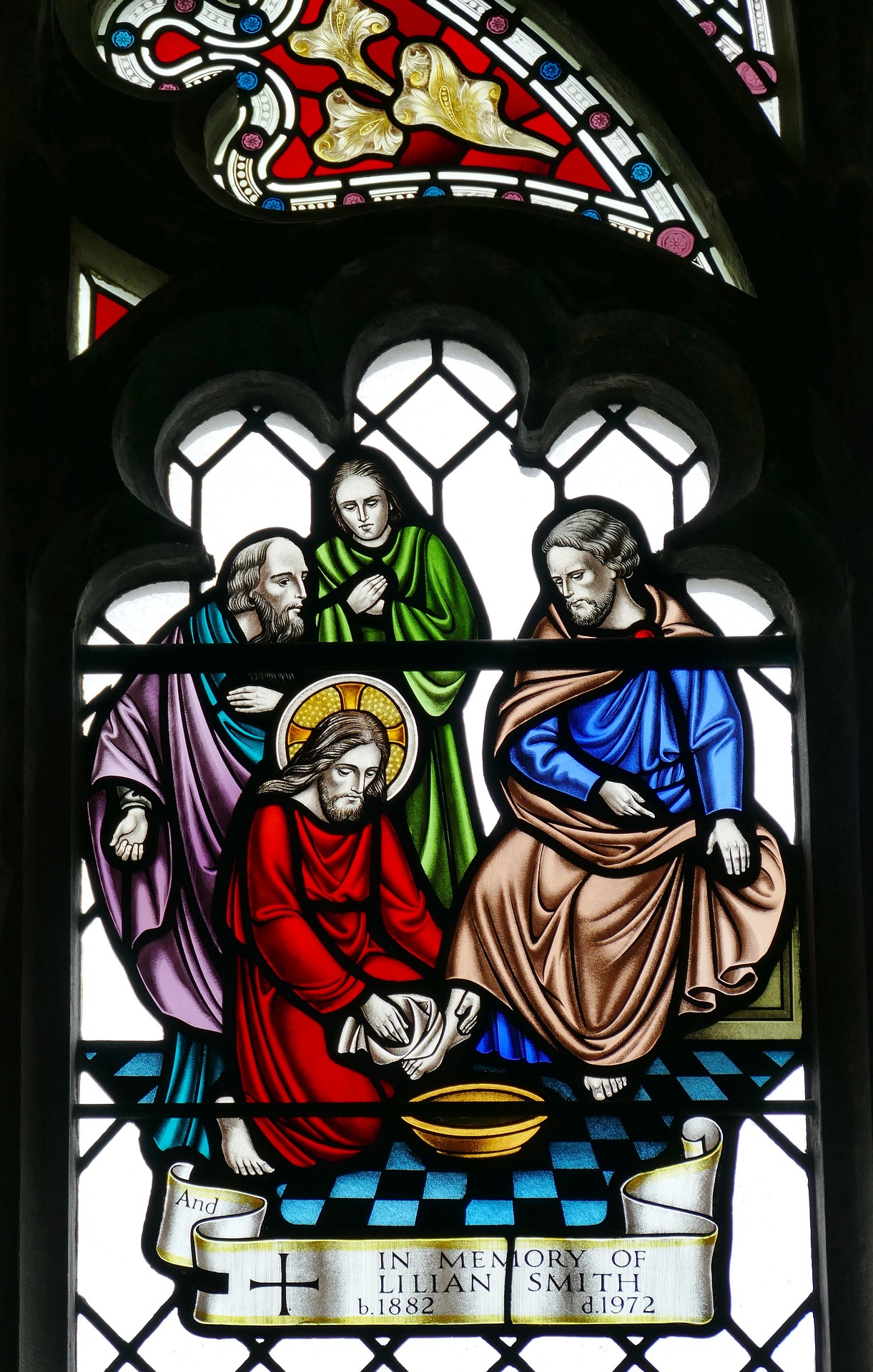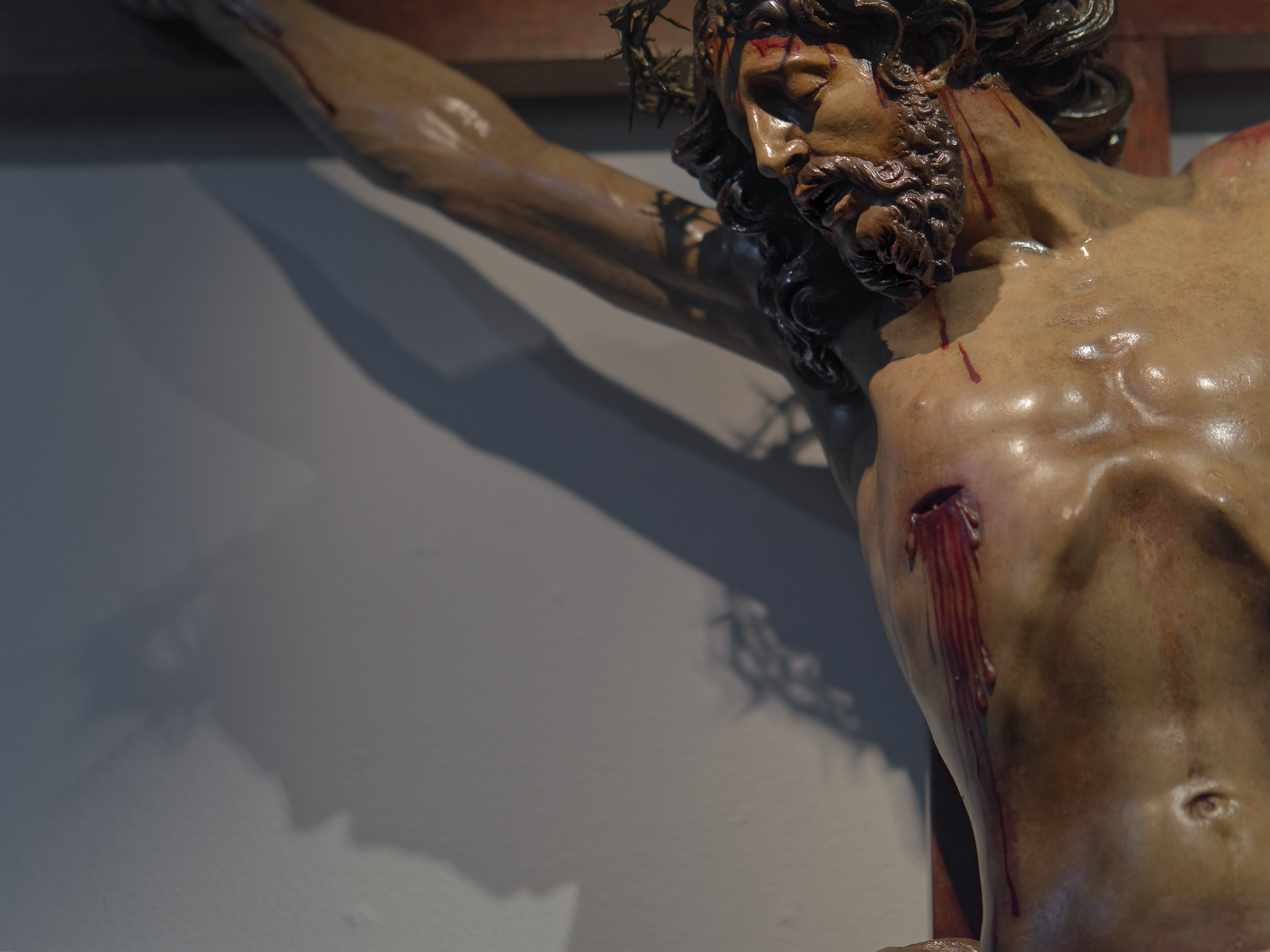At daybreak, Jesus left and went to a deserted place.
In today’s Gospel reading, we enter into just one of Jesus’ “days.” He had been teaching and healing non-stop for 24 hours at least. After he had left the synagogue [before today’s reading picks up], he went to Peter’s house, where he was asked to heal Peter’s mother-in-law who lay in bed with a severe fever. Jesus rebuked the fever and she immediately got up “and waited on them.” I imagine that meant cooking dinner, giving Jesus a bit of refreshment near the end of a busy day.
However, at sunset the house began to crowd with endless people pleading throughout the night for healing and hope. And now at daybreak, “Jesus left and went to a deserted place.” These are the words that are used in the Gospel of Luke to introduce the hours of solitude in which Jesus would be alone with his Father in prayer. These words are never used to indicate that Jesus was taking a break. He didn’t leave to escape the noise and demands of the crowds who needed him, but to reconnect with the Source of his Life, the Fire of Love that burned within him, his purpose, his desire. His great need was to stay in communion with the Father, and it was from this communion that he gained the strength and energy to give, to serve, to love, and eventually to lay down his life.
Saint John Paul II seemed to get his cue from Jesus himself. He received his drive, and his purpose, from prayer. The Pope’s schedule, according to Andreas Widmer, author of the book The Pope & the CEO: John Paul II’s Leadership Lessons to a Young Swiss Guard, ran something like this: The Pope rose before 6:00 and prayed in his private chapel before visitors joined him for Mass at 7:00. After Mass and an hour or two in the office, he would greet official visitors at 11:00, and then give his general audiences which were followed by lunch where he was joined by various Vatican staff. His lunches were the opportunity for him to be brought up to speed on what was happening in the various offices of the Vatican. Often he invited guests specifically to engage in a vigorous discussion on various theological or philosophical issues that concerned the life of the Church. After lunch, the Pope headed for the rooftop gardens of the Papal Palace to walk and talk with God. After this time of quiet prayer and rest, there were several hours of office work and more audiences until dinner at 8:00 where guests dined with him once more. After dinner he returned to reading and writing and praying well into the night, only turning out his lights at midnight or even later. We can imagine that this was a leisurely schedule compared to his schedule while traveling.
Widmer recalls that when John Paul II returned after being weeks on the road he didn’t head straight for his own apartment and collapse for a few days in exhaustion. As he arrived at the Vatican, he would stop and greet all the staff who had gathered to welcome him home and inspect the Swiss Guard lined up in honor formation, talking to each one and shaking their hands.
Widmer, who was a twenty-year-old Swiss Guard at the time and who was, like his fellow guards, in peak physical condition, describes how the young Swiss Guards were unable to keep up with the energy level of Saint John Paul II. He shared in his book how he tried to remember even once when he saw that schedule taking a toll on the pope. He couldn’t remember John Paul II ever exhausted, bleary-eyed, burnt out, irritated. The Swiss Guards who traveled with him on those trips were 40, 50, 60 years his junior, yet they returned home exhausted. The Pope instead was filled with energy and ready to pour himself out for others.
Just like Jesus, just like Saint John Paul II, each of us has a mission in life. Each of us have demands, are busy, have an overcrowded schedule. Each of us must deal with the rapid force of endless change and the fear of the uncertainty of what is right around the corner, the endless unknowns that could upset our life. Each of us is called in our vocation to pour ourselves out in response to whatever God asks of us.
Take your cue from Jesus today. Find your “deserted place” to recharge, regroup, renew. You may be able to stay there for moments, or it may be hours. You may find your deserted place in the car on a long commute or at night when the house has grown silent and all your family members are sleeping. Wherever it is and for whatever length of time you are able to be there, cherish your “deserted place” to commune with your God who will renew your energy, return your joy, and recharge your purpose in life.
Contact the author
Al día siguiente se fue a un lugar solitario.
En la lectura del Evangelio de hoy, entramos en solo uno de los “días” de Jesús. Había estado enseñando y sanando sin parar durante al menos 24 horas. Después de haber salido de la sinagoga [antes de que comience la lectura de hoy], fue a la casa de Pedro, donde se le pidió que curara a su suegra, que estaba en cama con mucha fiebre. Jesús reprendió la fiebre y ella inmediatamente se levantó “y se puso a servirles”. Me imagino que eso significaba preparar la cena, darle a Jesús un poco de refrigerio cerca del final de un día ajetreado.
Sin embargo, al atardecer la casa comenzó a llenarse con un sinfín de personas suplicando durante toda la noche por sanidad y esperanza. Y ahora, al amanecer, “Jesús partió y se fue a un lugar desierto”. Estas son las palabras que se utilizan en el Evangelio de Lucas para introducir las horas de soledad en las que Jesús estaría a solas con su Padre en oración. Estas palabras nunca se usan para indicar que Jesús estaba tomando un descanso. No partió para escapar del ruido y las demandas de las multitudes que lo necesitaban, sino para reconectarse con la Fuente de su Vida, el Fuego del Amor que ardía dentro de él, su propósito, su deseo. Su gran necesidad era permanecer en comunión con el Padre, y de esta comunión obtuvo la fuerza y la energía para dar, servir, amar y, finalmente, dar su vida.
San Juan Pablo II pareció entender el ejemplo del mismo Jesús. Recibió su impulso y su propósito de la oración. El horario del Papa, según Andreas Widmer, autor del libro The Pope & the CEO: John Paul II’s Leadership Lessons to a Young Swiss Guard, (El Papa y el CEO: Lecciones de Liderazgo de Juan Pablo II) para una joven Guardia Suizaera más o menos así: el Papa se levantaba antes de las 6:00 y rezaba en su capilla privada ante los visitantes, se unió a él para la Misa a las 7:00. Después de la Misa y una hora o dos en la oficina, saludaba a los visitantes oficiales a las 11:00 y luego daba sus audiencias generales seguidas de un almuerzo donde se le unían varios miembros del personal del Vaticano. Sus almuerzos fueron la oportunidad para que él se pusiera al día sobre lo que estaba sucediendo en las distintas oficinas del Vaticano. A menudo invitaba a los invitados específicamente a participar en una discusión vigorosa sobre varios temas teológicos o filosóficos que se relacionaban con la vida de la Iglesia. Después del almuerzo, el Papa se dirigió a los jardines de la azotea del Palacio Papal para caminar y hablar con Dios. Después de este tiempo de oración tranquila y descanso, hubo varias horas de trabajo de oficina y más audiencias hasta la cena a las 8:00 donde los invitados cenaron con él una vez más. Después de la cena, volvió a leer, escribir y orar hasta bien noche, y solo apagaba las luces a medianoche o incluso más tarde. Podemos imaginar que este era un horario pausado en comparación con su horario mientras viajaba.
Widmer recuerda que cuando Juan Pablo II regresaba después de estar de viaje por unas semanas, no se dirigía directamente a su propio apartamento a derrumbarse durante unos días por el agotamiento. Cuando llegaba al Vaticano, se detenía y saludaba a todo el personal que se había reunido para darle la bienvenida a casa e inspeccionaba a la Guardia Suiza en formación de honor, hablando con cada uno y dándoles la mano.
Widmer, que en ese momento era un guardia suizo de veinte años y que, al igual que sus compañeros de guardia, estaba en óptimas condiciones físicas, describe cómo los jóvenes guardias suizos no pudieron mantenerse al día con el nivel de energía de San Juan Pablo II. Compartió en su libro cómo trató de recordar incluso una vez cuando vio que ese horario le estaba afectaba al Papa. No podía recordar a Juan Pablo II alguna vez exhausto, con ojos llorosos, quemado, irritado. Los guardias suizos que viajaron con él en esos viajes eran 40, 50, 60 años menores que él, pero regresaron a casa exhaustos. El Papa, en cambio, estaba lleno de energía y dispuesto a entregarse por los demás.
Como Jesús, como San Juan Pablo II, cada uno de nosotros tiene una misión en la vida. Cada uno de nosotros tiene demandas, está ocupado, tiene un horario abarrotado. Cada uno de nosotros debe lidiar con la fuerza rápida del cambio sin fin y el miedo a la incertidumbre de lo que está a la vuelta de la esquina, las incógnitas infinitas que podrían trastornar nuestra vida. Cada uno de nosotros está llamado en nuestra vocación a entregarse en respuesta a lo que Dios nos pide.
Siga el ejemplo de Jesús hoy. Encuentra tu “lugar desierto” para recargar, reagrupar, renovar. Es posible que pueda permanecer allí por momentos, o pueden ser horas. Puede encontrar su lugar desierto en el automóvil en un viaje largo o por la noche cuando la casa se ha vuelto silenciosa y todos los miembros de su familia están durmiendo. Dondequiera que sea y durante el tiempo que puedas estar allí, atesora tu “lugar desierto” para comunicarte con tu Dios, quien renovará tu energía, te devolverá la alegría y recargará tu propósito en la vida.
Comunicarse con la autora




 J.M. Pallas has had a lifelong love of Scriptures. When she is not busy with her vocation as a wife and mother to her “1 Samuel 1” son, or her vocation as a public health educator, you may find her at her parish women’s bible study, affectionately known as “The Bible Chicks.”
J.M. Pallas has had a lifelong love of Scriptures. When she is not busy with her vocation as a wife and mother to her “1 Samuel 1” son, or her vocation as a public health educator, you may find her at her parish women’s bible study, affectionately known as “The Bible Chicks.”




 Sheryl is happy to be the number 1 cheerleader and supporter for her husband, Tom who is a candidate for the Permanent Diaconate in the Diocese of Kalamazoo. They are so grateful for the opportunity to grow together in this process. Sheryl’s day job is serving her community as the principal for St. Therese Catholic School in Wayland, Michigan. Since every time she thinks she gets life all figured out, she realizes just how far she has to go, St. Rita of Cascia is her go-to Saint for intercession and help. Home includes Carlyn, a very, very goofy Golden Retriever and Lucy, our not-so-little rescue puppy.
Sheryl is happy to be the number 1 cheerleader and supporter for her husband, Tom who is a candidate for the Permanent Diaconate in the Diocese of Kalamazoo. They are so grateful for the opportunity to grow together in this process. Sheryl’s day job is serving her community as the principal for St. Therese Catholic School in Wayland, Michigan. Since every time she thinks she gets life all figured out, she realizes just how far she has to go, St. Rita of Cascia is her go-to Saint for intercession and help. Home includes Carlyn, a very, very goofy Golden Retriever and Lucy, our not-so-little rescue puppy. 
 Kathryn James Hermes, FSP, is the author of the newly released title
Kathryn James Hermes, FSP, is the author of the newly released title
 Susan Ciancio has a BA in psychology and a BA in sociology from the University of Notre Dame, with an MA in liberal studies from Indiana University. For the past 19 years, she has worked as a professional editor and writer, editing both fiction and nonfiction books, magazine articles, blogs, educational lessons, professional materials and website content. Thirteen of those years have been in the pro-life sector. Currently Susan freelances and writes weekly for HLI, edits for American Life League, and is the executive editor of Celebrate Life Magazine. She also serves as executive editor for the Culture of Life Studies Program—an educational nonprofit program for K-12 students. You can reach her at
Susan Ciancio has a BA in psychology and a BA in sociology from the University of Notre Dame, with an MA in liberal studies from Indiana University. For the past 19 years, she has worked as a professional editor and writer, editing both fiction and nonfiction books, magazine articles, blogs, educational lessons, professional materials and website content. Thirteen of those years have been in the pro-life sector. Currently Susan freelances and writes weekly for HLI, edits for American Life League, and is the executive editor of Celebrate Life Magazine. She also serves as executive editor for the Culture of Life Studies Program—an educational nonprofit program for K-12 students. You can reach her at 
 Tami Urcia grew up in Western Michigan, a middle child in a large Catholic family. She spent early young adulthood as a missionary in Mexico, studying theology and philosophy, then worked and traveled extensively before finishing her Bachelor’s Degree in Western Kentucky. She loves tackling projects, finding fun ways to keep her little ones occupied, quiet conversation with the hubby and finding unique ways to love. She works at for Christian Healthcare Centers, is a guest blogger on
Tami Urcia grew up in Western Michigan, a middle child in a large Catholic family. She spent early young adulthood as a missionary in Mexico, studying theology and philosophy, then worked and traveled extensively before finishing her Bachelor’s Degree in Western Kentucky. She loves tackling projects, finding fun ways to keep her little ones occupied, quiet conversation with the hubby and finding unique ways to love. She works at for Christian Healthcare Centers, is a guest blogger on 
 Leslie Sholly is a Catholic, Southern wife and mother of five, living in her hometown, Knoxville, Tennessee. She graduated from Georgetown University with an English major and Theology minor. She blogs at
Leslie Sholly is a Catholic, Southern wife and mother of five, living in her hometown, Knoxville, Tennessee. She graduated from Georgetown University with an English major and Theology minor. She blogs at 
 Deacon Dan Schneider is a retired general manager of industrial distributors. He and his wife Vicki have been married for over 50 years. They are the parents of eight children and thirty grandchildren. He has a degree in Family Life Education from Spring Arbor University. He was ordained a Permanent Deacon in 2002. He has a passion for working with engaged and married couples and his main ministry has been preparing couples for marriage.
Deacon Dan Schneider is a retired general manager of industrial distributors. He and his wife Vicki have been married for over 50 years. They are the parents of eight children and thirty grandchildren. He has a degree in Family Life Education from Spring Arbor University. He was ordained a Permanent Deacon in 2002. He has a passion for working with engaged and married couples and his main ministry has been preparing couples for marriage.
 Mike Karpus is a regular guy. He grew up in Michigan’s Upper Peninsula, graduated from Michigan State University and works as an editor. He is married to a Catholic school principal, raised two daughters who became Catholic school teachers at points in their careers, and now relishes his two grandchildren, including the 3-year-old who teaches him what the colors of Father’s chasubles mean. He has served on a Catholic School board, a pastoral council and a parish stewardship committee. He currently is a lector at Mass, a Knight of Columbus, Adult Faith Formation Committee member and a board member of the local Habitat for Humanity organization. But mostly he’s a regular guy.
Mike Karpus is a regular guy. He grew up in Michigan’s Upper Peninsula, graduated from Michigan State University and works as an editor. He is married to a Catholic school principal, raised two daughters who became Catholic school teachers at points in their careers, and now relishes his two grandchildren, including the 3-year-old who teaches him what the colors of Father’s chasubles mean. He has served on a Catholic School board, a pastoral council and a parish stewardship committee. He currently is a lector at Mass, a Knight of Columbus, Adult Faith Formation Committee member and a board member of the local Habitat for Humanity organization. But mostly he’s a regular guy.